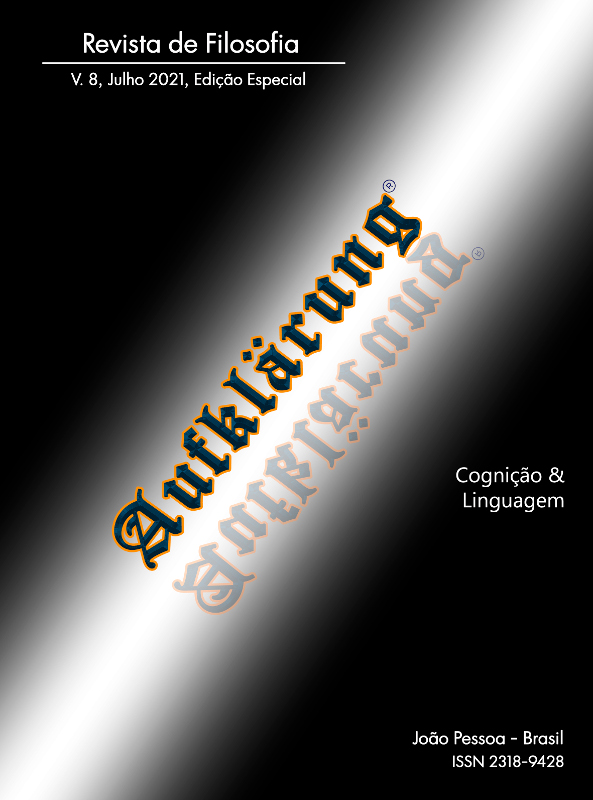A linguistic account of singular terms
DOI:
https://doi.org/10.18012/arf.v8iesp.60029Palavras-chave:
singular terms, definiteness, uniqueness, reference, VendlerResumo
Vendler (1967b) discusses how we may linguistically recognize a singular term. Even though singular terms are relevant to Philosophy and not necessarily to Linguistics, it may be enriching to know what we can do to disambiguate such a term. Philosophically, singular terms are seen as singular definite descriptions which may be used to refer to a unique entity in the world. Vendler tried to provide a syntactic account of singular terms, and was not taken into account by philosophers. Linguistically speaking, a singular term will be a singular definite determiner phrase which may or may not correlate to something. We will show that a strictly syntactic account, as the one Vendler proposed, is deficient, and that it does not provide necessary and sufficient conditions to recognize a singular term. We will take into account Vendler’s spirit. We will use the advances in linguistics to explain how we may form a singular term, and provide syntactic-semantic conditions to recognize a singular term.
Downloads
Referências
ABBOTT, B. Reference. New York: Oxford University Press, 2010.
BORER, H. Structuring sense: in name only. Oxford: Oxford University Press, 2005.
BORIK, O.; ESPINAL T. On definite kinds. Recherches Linguistiques de Vincennes, v. 41, n. 1. p. 123-146, 2012.
BURGE, T. Truth and mass terms. Journal of Philosophy, v. 69, p. 263-282, 1972.
CHRISTOPHERSEN, P. The articles: a study of their theory and use in English. Copenhagen: Munksgaard. 1939.
CINQUE, G. Typological studies: word order and relative clauses. New York; London: Routledge, 2013.
DEVITT, M. The case for referential descriptions. In: REIMER, M.; BEZUIDENHOUT, A. (Eds.) Descriptions and beyond. Oxford: Oxford University Press, 2004. p. 234-260.
ENÇ, M. The semantics of specificity. Linguistic Inquiry, v. 22, n. 1, p. 01-25, 1991.
FREGE, G. On sense and reference. In: BLACK, M.; GEACH, P. (Eds.) Translations from the philosophical writings of Gottlob Frege, Oxford: Basil Blackwell, 1960. p. 56-68.
FREGE G. On Concept and Object. In: BLACK, M.; GEACH, P. (Eds.) Translations from the philosophical writings of Gottlob Frege, Oxford: Basil Blackwell, 1960. p. 42-56.
HALE, B. Singular Terms. In: MCGUINNESS B.; OLIVERI, G. (Eds.) The philosophy of Michael Dummett. Dordrecht: Springer, 1994. p. 268-272.
HARBOUR, D. Mass, non-singularity and augmentation. MIT Working Papers in Linguistics, v. 49, p. 239-266, 2008.
HARRIS, Z. Co-occurrence and transformation in linguistic structure. Language, v. 33, n. 3, p. 283-340, 1957.
HEIM, I. The semantics of definite and indefinite noun phrases. PhD Dissertation (Doctor of Philosophy), University of Massachusetts, 1982.
HINTIKKA, J. Are there nonexistent objects? Why not? But where are they? In: HINTIKKA, J. The logic of epistemology and the epistemology of logic: selected essays. Dordrecht: Kluwer, 1989. p. 37-44.
KAYNE, R. The antisymmetry of syntax. Cambridge, MA: MIT Press, 1974.
KRIFKA, M.; PELLETIER, F. J.; CARLSON, G.; TER MEULEN, A.; LINK, G.; CHIERCHIA, G. Genericity: an introduction. In: CARLSON, G.; PELLETIER, F. J. (Eds.) The generic book. Chicago: University of Chicago Press, 1995. p. 01-124.
MARANTZ, A. No escape from syntax: don’t try morphological analysis in the privacy of your own lexicon. In: DIMITRIADIS, A.; SIEGEL, L.; SUREK-CLARK, C.; WILLIAMS, A. (Eds) PWPL 4.2, Proceedings of the 21st Annual Penn Linguistics Colloquium. Pennsylvania: University of Pennsylvania Working Papers in Linguistics, 1997. p. 201-225.
MILSARK, G. Existential sentences in english. Cambridge, MA: MIT doctoral dissertation. 1974.
POLAKOF, A. Lo concreto y lo abstracto en nominalizaciones de adjetivales. Revista Signos. Estudios de Lingüística, v. 52, n. 100, p. 410-431, 2019.
POLAKOF, A. La semántica de los nombres abstractos. In: BÉRTOLA, C.; OGGIANI, C.; POLAKOF, A. (Eds.) Estudios de lengua y gramática. Montevideo: In press.
RUSSELL, B. On Denoting. Mind, v. 14, p. 479-493, 1905.
RUSSELL, B. Descriptions. In: MARTINICH, A. P. (Ed.) The philosophy of language. Oxford: Oxford University Press, 1996. p. 208-214.
STIRTON, W. R. Singular term, subject and predicate. The Philosophical Quarterly, v. 50, n. 199, p. 191-207, 2000.
STRAWSON, P. On referring. Mind, v. 59, n. 235. p. 320-344, 1950.
VENDLER, Z. Linguistics in philosophy. Ithaca; London: Cornell University Press, 1967a.
VENDLER, Z. Singular terms. In: VENDLER, Z. Linguistics in philosophy. Ithaca; London: Cornell University Press, 1967. p. 147-171. (1967b)
VERGNAUD, J.R. French relative clauses. Ph.D. Dissertation, MIT, 1974.
VERGNAUD, J. R.; ZUBIZARRETA, M. L. The definite determiner and the inalienable constructions in French and in English. Linguistic Inquiry, v. 23, n. 4, p. 595-652, 1992.
WETZEL, L. Dummett's criteria for singular terms. Mind, v. 99, n. 394, p. 239-254, 1990.
Arquivos adicionais
Publicado
Como Citar
Edição
Seção
Licença

Este trabalho está licenciado sob uma licença Creative Commons Attribution 4.0 International License.
Política de Direito Autoral para os itens publicados pela Revista:
1.Esta revista é regida por uma Licença da Creative Commons aplicada a revistas eletrônicas. Esta licença pode ser lida no link a seguir: Creative Commons Attribution 4.0 International (CC BY 4.0).
2.Consonante a essa politica, a revista declara que os autores são os detentores do copyright de seus artigos sem restrição, e podem depositar o pós-print de seus artigos em qualquer repositório ou site.
Política de Direito de Uso dos Metadados para informações contidas nos itens do repositório
1. Qualquer pessoa e/ou empresa pode acessar os metadados dos itens publicados gratuitamente e a qulquer tempo.
2.Os metadados podem ser usados sem licença prévia em qualquer meio, mesmo comercialmente, desde que seja oferecido um link para o OAI Identifier ou para o artigo que ele desceve, sob os termos da licença CC BY aplicada à revista.
Os autores que têm seus trabalhos publicados concordam que com todas as declarações e normas da Revista e assumem inteira responsabilidade pelas informações prestadas e ideias veiculadas em seus artigos, em conformidade com a Política de Boas Práticas da Revista.






































